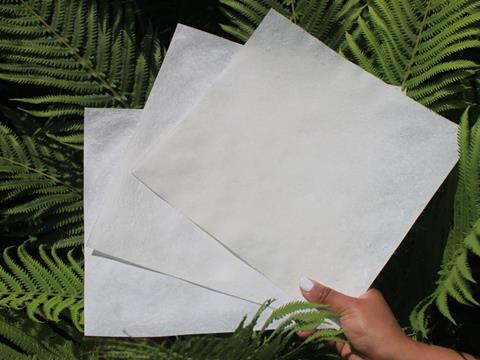
With less than two months to go until our Sustainability Awards, which will be unveiled during the Sustainable Packaging Summit in Utrecht in November this year, we hear from Paramount Planet Product, a finalist in the pre-commercialized Climate category, about their flat sheets entirely made from fibrillated cellulose.
You’re a finalist in the Sustainability Awards 2025. Congratulations! To start off, could you summarize your entry, in less than 50 words?
It is a flexible, biodegradable flat sheet composed entirely of nano-cellulose formed without synthetic binders. The material offers high strength and scalability, making it suitable for sustainable applications in packaging, barrier films, and coatings while remaining fully compostable in soil and marine environments.
Why do you think the judges were impressed with your entry? Tell us about what is innovative about your project and/or about its impact on packaging sustainability?
Our innovation addresses a fundamental challenge in sustainable materials engineering: forming high-performance structures from pure nano-cellulose. Unlike traditional biodegradable materials that incorporate synthetic additives or binders, this sheet is composed entirely of fibrillated cellulose, enabling complete environmental decomposition without generating microplastics. The key advancement lies in the processing technique, which allows controlled water removal and dimensional stability, overcoming issues such as shrinkage, brittleness, and collapse during drying. The resulting sheets possess strong mechanical integrity and flexibility even without the use of coatings or reinforcements. The versatility of this platform enables applications across multiple sectors, including flexible bioplastics, food-safe wrapping, biodegradable coatings, and medical materials. This level of functionality, combined with pure material composition and scalability, likely contributed to the judges’ recognition of its innovation and sustainability impact.
Finally, can you tell us about the ongoing development of your project, e.g. how your innovation/initiative has been received by industry, or what are the next steps in commercialization/product development?
We are actively advancing both the technological and environmental validation of our nano-cellulose sheet material. With support from multiple National Science Foundation Small Business Innovation Research (NSF SBIR) awards, we have developed custom machinery capable of processing nano-cellulose into scalable, high-performance sheet formats. Current research efforts are focusing on biodegradability testing under standardized conditions simulating terrestrial and marine environments. Early results indicate rapid degradation, particularly under dynamic seawater exposure, validating the material’s suitability for open-environment applications.
To ensure environmental safety, we are partnering with leading academic institutions to establish rigorous ecotoxicological assessments. In collaboration with experts in bioengineering and toxicology, we are developing a new certification framework designed to confirm the safety of the material for marine organisms. Initial biological assays using zebrafish models show minimal physiological stress and suggest that the material poses no observable harm to aquatic life.
On the manufacturing side, we are optimizing the production process for energy and resource efficiency. This process involves utilizing lower solids content to achieve energy savings and implementing closed-loop systems to reclaim and reuse process water. Preliminary assessments also suggest the material may be compatible with existing paper recycling streams, with confirmatory testing in progress.
Looking ahead, our efforts are centered on scaling production, validating long-term performance across a range of use cases, and engaging with strategic partners for commercialization. These next steps are essential in translating laboratory success into real-world impact across sustainable packaging and bio-based materials markets.


















No comments yet